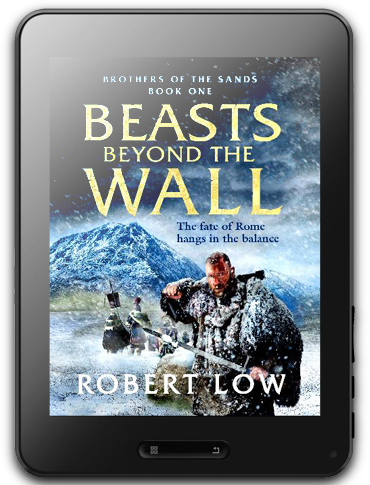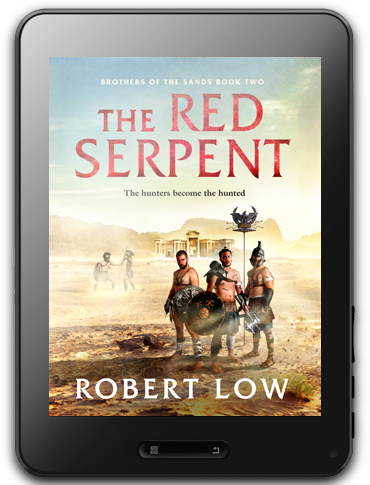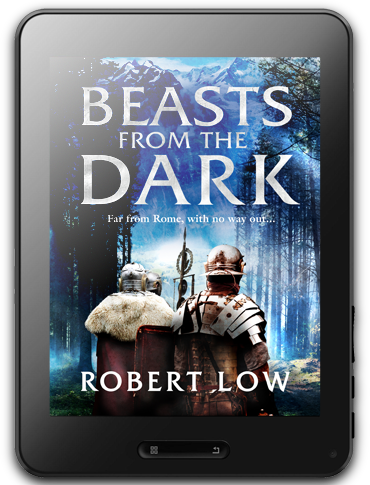 home | about | blog | comments | Border Reivers |Brothers Of The Sand |Kingdom Series | Oathsworn Series
home | about | blog | comments | Border Reivers |Brothers Of The Sand |Kingdom Series | Oathsworn Series
The Brothers Of The Sand Series
Introductory Q&A
There's loads of historical fiction based in the Roman period – which, some might say, is reason enough to avoid it. What made you decide to finally go there?
The idea that I wasn't finding anything I wanted to read in the genre - bar Harry Sidebottom, who is the Jedi Master of the Roman period. I was sick of shiny hero legionaries, or fictional biogs of real Roman emperors, or gladiators who seemed completely at odds with the reality of their lot.
Once you went there, how easy was it to identify an approach in which you felt you had something fresh to say?
First comes the idea for the story, then you 'go there' whether it seems a sensible option or not. I knew I had something fresh to say from the off.
The new story takes place in the world of gladiators; and, as we've seen before (horned Norse helmets, for example) there are many inaccuracies to have dripped into history over the centuries. Are there any you are most pleased to have taken aim at? Are there any that surprised you during your research?
The biggest one is the one perpetrated by That Movie - that gladiators won or died and had a say in their lot. Gladiators were the socially reviled of Rome - they were the lowest of the low, even as the highest of the high courted and flirted, even if they had their names and faces on the marketing, such as cups and vases. They were slaves, which was one step up from furniture and, in addition, they were gladiators, which was one step down from slaves. In addition is the myth that they won or died. Gladiators were highly-trained, cost a fortune to keep and fought maybe four or five times a year. They were not thrown away - deaths in the arena only happened a: by accident. b: if someone rich (usually the Emperor) paid enough to the owner to make it worth his while. That was rare.
Staying on research, are there any particular historical points that inspired you?
The fact that the Emperor popularly know as Caracalla (The Hood) got his name for his teen-brat tendency to run with a pack round the night streets of Rome beating people up. That and how he was a womaniser who had no children known - yet his successor, the one who eventually called himself Elagabalus, was touted as his son when aiming for the throne and looked so like him no-one queried it. Those two facts formed the genesis of the tale.
Who are your favourite new characters, and why?
It's an ensemble - I like Drust, who needs a family and this is the only one he has. His constant angst about leading, about how crap a fighter he is etc etc is pretty much out of me, I guess. The others all bring something and this is exactly what I did for the Viking books and even, to a certain extent, the Kingdom series.
Is there an overarching message in the story?
Redemption of the little guys. How the least considered can still win through with courage, luck and a long streak of vicious.
What would you say are the main connections between your exploration of the Roman, Viking and Scottish Wars of Independence periods?
The characters. Any one of my Vikings, or Scottish medievals would find the craic a joy if they ended up in a taberna in Rome with Drust and the Brothers of the Sand. The resultant and inevitable rammy would be a joy to watch, too.
Gladiator glossary – discover the meanings in Brothers of the Sand
![]()
The Beasts Beyond The Wall (January 21, 2019)
 Drust and Kag, two ring-hardened fighters who won their freedom with blood, are met with an unusual request. The mysterious, powerful Servilius Structus sends them deep into Scotland, land of the Caledonii, to find and secure a woman and her young son. But it's not clear why... and what could go wrong, heading over the last Wall into the Land of Darkness?
Drust and Kag, two ring-hardened fighters who won their freedom with blood, are met with an unusual request. The mysterious, powerful Servilius Structus sends them deep into Scotland, land of the Caledonii, to find and secure a woman and her young son. But it's not clear why... and what could go wrong, heading over the last Wall into the Land of Darkness?
Accompanied by Ugo, Quintus, Manius, and Sibanus, this crew of ex–gladiator rogues, tricksters and bar-room philosophers will risk everything on an insane quest and a daring escape. In the dog days of Rome, with decadence and corruption in the air, the consequences of their failure are far greater than they could ever dream: not only their lives but the Empire itself is at stake.
The Red Serpent (July 5, 2019)
 At the edge of the empire, the hunters become the hunted...
At the edge of the empire, the hunters become the hunted...
They're back - Drust, Kag, Ugo, Sib and some new faces - as dirt-ridden and downbeat as ever.
Drawn to the edge of the Roman world and the blasted deserts of the Syrian frontier, they are presented with a mysterious riddle from their old companions, Dog and Manius. In the scorching heat, plots and rumours breed like flies on a corpse.
To survive, Drust and the others must face all challengers along with Mother Nature's rage. Sometimes they'll stand and fight; sometimes they'll run as fast as they can and pray to the Gods. For it is a mad and violent world, and they must be equal to it...
Beasts From The Dark (January 6, 2020)

Drust, Kag and co are in the Alps, battered, bruised and fighting for their lives. Some things never change.
On the hunt for a rogue Roman officer, something goes terribly wrong and they are left stranded in the mountains, their escape route cut off. Only then does the true danger of their mission reveal itself.
Caught in the crossfire not just of the mountain tribes, but of the vicious power politics of Rome, they must use all their cunning and guile to save themselves from death's icy clutches...
The gripping final instalment of the extraordinary, brutal, visceral historical epic series.